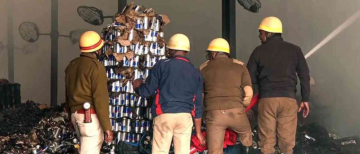A tragic fire broke out on a private sleeper bus travelling from Jaisalmer to Jodhpur on Tuesday afternoon, leading to the deaths of at least 20 people, including three children, and leaving 16 others critically injured. The incident, which has shocked the nation, occurred near Thaiyat village, about 10 kilometres from Jaisalmer city on the Jaisalmer-Jodhpur highway.

Details emerging from the investigation suggest that the fire was caused by a short circuit in the air-conditioning system of the bus. The vehicle, operated by KK Travels and bought only five days ago, had been recently converted from a non-air-conditioned bus into an air-conditioned sleeper coach. The modification involved the installation of fibre body panels, curtains, and glass windows, which unfortunately aided the rapid spread of the fire. The burning electrical wiring likely triggered a gas leak that ignited the fire at the front of the bus.
The tragedy unfolded quickly. Smoke was first noticed near the rear of the moving bus, and within minutes, flames engulfed the vehicle. Passengers seated inside struggled to escape as the fire spread rapidly through flammable interiors. The strong glass windows and fibre panels trapped the heat inside, and, tragically, the bus’s sole exit door at the front got locked due to the fire, blocking one of the main escape routes. Passengers tried to break windows to get out, but many were unable to do so in time.

Eyewitnesses recounted the horror as people jumped from the moving bus to escape the inferno. The Army team stationed nearby arrived promptly, using heavy machinery to break open the bus door and aid rescue efforts. However, the rescue operation faced delays of nearly four hours because the metal body of the bus remained extremely hot, hindering quick access and the removal of trapped passengers.
Authorities have confirmed that 19 bodies were charred inside the vehicle, with one more passenger dying during treatment after being rescued. Six of the deceased are from Jodhpur, with the rest belonging to Jaisalmer. Survivors and officials noted the fire flashpoint was near the air-conditioning system, reinforcing the short circuit theory.

This tragic incident reveals crucial safety lapses that merit serious attention. The rapid modification of the bus into an AC sleeper coach within days raises questions about the quality and rigour of safety inspections. Reports that the bus had only one functional exit door during the fire — effectively turning the bus into a death trap — highlight the grave dangers of inadequate safety measures in public transport vehicles.
The incident also underscores the vital importance of emergency preparedness and timely rescue operations, especially in remote areas. The presence of a nearby Army station helped save many lives, though some delays were unavoidable due to the intensity of the blaze.

Prime Minister Narendra Modi expressed his condolences and announced financial assistance for the victims, while Rajasthan’s Chief Minister Bhajanlal Sharma visited Jaisalmer to oversee the response and aid the injured. Local authorities opened helplines for families to identify the deceased and called for stringent safety regulations to prevent such disasters in the future.
In conclusion, the Jaisalmer bus fire is a stark reminder of the perils of overlooking safety in public transportation. It is crucial that vehicle modifications, especially involving critical systems like air conditioning, undergo thorough certification and quality checks. Regulatory bodies must enforce strict compliance with safety standards, including multiple unobstructed emergency exits, to safeguard passenger lives. This tragedy calls for collective efforts by authorities, transport companies, and the public to prioritise safety above all else on our roads.
With inputs from agencies
Image Source: Multiple agencies
© Copyright 2025. All Rights Reserved. Powered by Vygr Media.






















